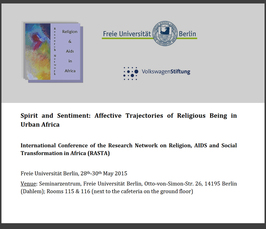"Spirit and Sentiment: Affective Trajectories of Religious Being in Urban Africa"
Workshops, conferences 2015
- Start: May 28, 2015 05:30 PM (Local Time Germany)
- End: May 30, 2015 06:45 PM
- Location: Freie Universität Berlin
- Room: Seminarzentrum

For more details please contact esser(at)mmg.mpg.de.
Organizing Team:
- Hansjörg Dilger (Freie Universität Berlin, Institute of Social and Cultural Anthropology)
- Astrid Bochow (Georg-August University Göttingen, Institute for Cultural and Social Anthropology)
- Marian Burchardt (Max Planck Institute for the Study of Ethnic and Religious Diversity, Göttingen)
- Matthew Wilhelm-Solomon (African Center for Migration and Society, Wits University)
The conference was co-sponsored by the Volkswagen Foundation Program "Knowledge for Tomorrow – Cooperative Research Projects in Sub-Saharan Africa"
With keynote speeches by:
- Prof. Dr. Filip de Boeck, University of Leuven
- Prof. Dr. AbdouMaliq Simone, Goldsmiths College, University of London
This conference focuses on the multiple articulations between the wide
array of affective and emotional states that living in and beyond urban
Africa implies, on the one hand, and religious practices and ideas
present in African cities and that may impact on the former, on the
other.
While a further goal of the conference is to establish a link between
these various domains and HIV/AIDS, this is not an obligatory
requirement for paper submissions. In a fundamental sense, the emotional
and affective dynamics in urban Africa – and the social, political and
material configurations that sustain (or are sustained by) them – are
bound up with religion, its politics of collective aspirations and
presence in material public space, and its material practices: First,
religious ideas and practices offer affective regimes that regulate the
hermeneutics of religious selves; second, religion allows people to
encode their emotional states in religious and/or spiritual terms that
may shape their maps of meaning and guide their movements; third, it
supplies affective forms of belonging that are often simultaneously
localized and transnational and thus forge new notions of emplacement;
fourth, it provides ritual spaces for catharsis, peace and elation –
hence an outlet for the discord and anxiety of city life – but religious
groups and rituals may also foster aggression towards those considered
outside their moral order; and fifth, religious communities often
provide concrete material, emotional and organizational support and care
to those in need and danger.